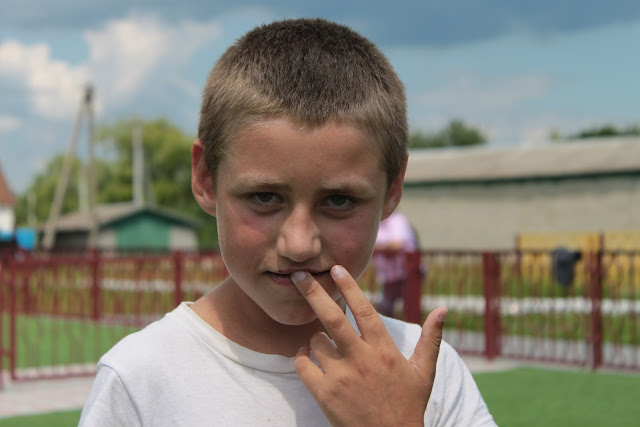Mahatma Gandhi
"What do you do when a child comes up to you and starts crying?" It was a curious question - one that I wasn't prepared to answer in the middle of a training meeting with Angela, the only nurse and teacher willing enough to work with the boys of Romaniv. She went on, "I have found that, through the day, many of the boys cry without any reason at all - and I never know what to do."
In Ukraine, when a child under the age of 4 years is abandoned by their parents - with a disability or without - they are brought to a facility called a "baby house". Some of the baby houses of Ukraine are well-kept and well-run, providing quality services and a nurturing environment. But, unfortunately, such facilities are few and far between. Too often, these facilities are grossly understaffed and overcrowded with room after room lined with cribs. It is said that walking the halls of such facilities is eerily quiet. Babies quickly learn not to cry - because, what's the use? No one will come. It becomes ingrained in their behavioral DNA that they are unwanted and worth nothing.
As these babies grow older, this DNA of worthlessness begins to seep deeper into their hearts. Children with disabilities are sent into a dizzying system of disability institutions at the age of just 4 years. Evaluated by state officials, children are sent to live in institutions according to the level of disability they are given by the government. Children with only mild disabilities are sent to facilities with teachers and relatively positive outcomes. But those children who are deemed "unteachable" are herded into hidden places where the goal is simple: to keep them alive.
It's hard to imagine such a measly price tag put on a human life....on children who are born with air in their lungs and blood in their veins. Even the most profoundly disabled human beings have fingerprints and elbows. Even those that are blind and bed-ridden have eyelashes and earlobes. Yet the price put on their heads by their own people is meager.
Sometimes I stop and turn my mind to Romaniv and to the boys who suddenly cry without reason. And as I reflect on Angela's question, the answer stares straight back at me with such dutiful tenacity that I have nothing left to do but press on. Press on to create support services that will invest in teaching these people the skills they need to be part of society. Press on to build communities that recognize that people with disabilities have a value and merit on their price tags.
And as I answer this question for myself, I will ask you the same:
What price tag do you put on people with disabilities?
"What do you do when a child comes up to you and starts crying?" It was a curious question - one that I wasn't prepared to answer in the middle of a training meeting with Angela, the only nurse and teacher willing enough to work with the boys of Romaniv. She went on, "I have found that, through the day, many of the boys cry without any reason at all - and I never know what to do."
No answer that I could give to Angela would even begin to scratch the surface of the seemingly insurmountable issues that she is facing. And, if we scratch too deep for the answer, we will find that the societal reality that children with disabilities around the world live with every day is more shocking and terrible than we think.
In Ukraine, when a child under the age of 4 years is abandoned by their parents - with a disability or without - they are brought to a facility called a "baby house". Some of the baby houses of Ukraine are well-kept and well-run, providing quality services and a nurturing environment. But, unfortunately, such facilities are few and far between. Too often, these facilities are grossly understaffed and overcrowded with room after room lined with cribs. It is said that walking the halls of such facilities is eerily quiet. Babies quickly learn not to cry - because, what's the use? No one will come. It becomes ingrained in their behavioral DNA that they are unwanted and worth nothing.
As these babies grow older, this DNA of worthlessness begins to seep deeper into their hearts. Children with disabilities are sent into a dizzying system of disability institutions at the age of just 4 years. Evaluated by state officials, children are sent to live in institutions according to the level of disability they are given by the government. Children with only mild disabilities are sent to facilities with teachers and relatively positive outcomes. But those children who are deemed "unteachable" are herded into hidden places where the goal is simple: to keep them alive.
It's hard to imagine such a measly price tag put on a human life....on children who are born with air in their lungs and blood in their veins. Even the most profoundly disabled human beings have fingerprints and elbows. Even those that are blind and bed-ridden have eyelashes and earlobes. Yet the price put on their heads by their own people is meager.
Sometimes I stop and turn my mind to Romaniv and to the boys who suddenly cry without reason. And as I reflect on Angela's question, the answer stares straight back at me with such dutiful tenacity that I have nothing left to do but press on. Press on to create support services that will invest in teaching these people the skills they need to be part of society. Press on to build communities that recognize that people with disabilities have a value and merit on their price tags.
And as I answer this question for myself, I will ask you the same:
What price tag do you put on people with disabilities?





